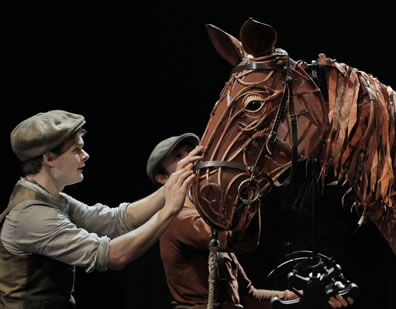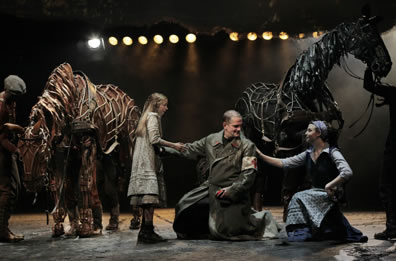War Horse
A Horse! A Horse! And Something Much More
Based on the novel by Michael Morpurgo, adapted by Nick Stafford
National Theatre of Great Britain, Lincoln Center Theater at the Vivian Beaumont, New York City
Saturday, February 4, 2012, A–311&312 (front, center loge)
Directed by Marianne Elliot and Tom Morris

Andrew Durand (Albert) strokes Joey while Leah Hoffmann, one of the puppeteers, controls the horse's head in the National Theatre of Britain production of War Horse at the Lincoln Center Threater. The Handspring Puppet Company brought the horses and other animals to life in this stage version of Michael Morpurgo's novel. Photo by Paul Kolnik, Lincoln Center Theater.
As of this year, any review of the stage version of War Horse will perforce compare the play to the Steven Spielberg movie of the same name and genesis. The play—based on Michael Morpurgo’s 1982 book about Joey, a British horse sent off to serve in World War I and followed by his original owner, the teen-age boy Albert Narracott—opened 2007 at the National Theatre, transfered to London’s West End in 2009 and is still playing there and touring the United Kingdom. It has been playing at Lincoln Center since April 2011 and will soon set off on a North American tour. The movie opened this past Christmas Day.
Given that, let’s tackle the pressing practical question: should you see either the play or the movie or both? If you’ve seen the play, you don’t need to see the movie; if you’ve seen the movie, you still should see the play.
We’ll overstep entirely the matter of the movie’s quality, which earned it an Academy Award Best Picture nomination. We’ll set aside for the moment how the movie Spielberged key characters and plot points. For now, we’ll address the biggest difference between the screen and stage versions of War Horse: The former used real horses; the stage version uses puppets.
Advantage goes to the puppets. Real horses—even those enhanced by computer-generated imagery—may be a marvel of nature, but the Handspring Puppet Company’s horses (and an ornery goose, as well) were marvels of technical ingenuity and human artistry. As anthropomorphic as Spielberg and Disneynature films make real animals, they still don’t have the inexplicable soul of a puppet manipulated by humans. While we almost always react in delight and admiration when a real animal takes the stage, something in our basic nature makes us watch wide-eyed and awe-smiling when a puppet takes life, and we unhesitatingly accept the puppet as a living being. In a recent Shakespeareances.com review, I made much over Oliver, a real dog, playing the character of Crab in the Shakespeare Theatre Company production of Two Gentlemen of Verona. A few days later, we saw a concert production of the musical version of the play with Launce carrying a hand puppet playing Crab. I considered Oliver’s performance definitive and wouldn’t lose that theatrical moment for the world. Yet, the puppet Crab joining the chorus line of singers and reading the score as he sang was a piece of theatrical magic Oliver never could achieve.
So, the true stars of this War Horse were actors we could barely see: Alex Hoeffler, Jeslyn Kelly, and Enrico D. Wey as Joey, and Leah Hofmann, Isaac Woofter, and Zach Villa as Topthorn, Joey’s British cavalry colleague who ends up accompanying Joey on his adventures behind the German lines. With one puppeteer handling the front legs and haunches, another working the hind legs and tail, and the third puppeteer masquerading as a man with a lead on the horse controlling the head, these puppets became living, breathing, grazing, fly-swatting, plowing, galloping, loving, frightening, and frightened equines. “They seem so real,” said people in the audience during the play’s intermission. By play’s end, there was no “seems” qualifier. And why not? The original puppet Joey of the London production forged a friendship with a real horse in a show-ring test of the puppeteers’ skills.
Even with such good puppetry, plot and production values still are necessary to make a play the kind of success War Horse is. Rae Smith’s set was a bare stage with props—a door, a plough, rails for a paddock—brought on as needed. A riser created the geography for the scene in which Joey gets hung up in no man’s land between the British and German trenches. Above the stage, a screen shaped like the scrap of paper Albert tore from a sketchbook carried projections (credited to 59 Productions) of clouds, rain, and other atmospheric conditions as well as pencil drawings of the horses and armies, a multiplier device for the characters on stage. Traditional songs, sung and played in the Celtic style that simultaneously sound so sad but hopeful, punctured the action. For this tale is full of ongoing sadness even as it holds out hope that Albert will eventually reunite with Joey.
Albert’s quest has something of an autistic aspect to it, so focused is the teen-age boy’s attention on finding Joey regardless of any and all other considerations. In this regard, the movie takes a divergent path from the stage play and loses its way. Spielberg grafted Albert’s innocent demeanor with his over-earnest passion for Joey creating a character whose whining protestations get annoying but still play as a heroic stance against naysayers. In the Lincoln Center production, while Andrew Durand played the part similarly, his behavior contrasted significantly not only with the people around him but with the circumstances, too, muting the heroic aspect of Albert.
The Spielbergian translations may seem insignificant individually, intended as they are to give audiences clear-cut heroes and villains, but they add up to a whole different context for Albert’s behavior:
- In the movie, Albert’s father, Ted, was an alcoholic dealing with post-traumatic stress disorder from his service in the Boer War; in the stage play, Ted (an unrelentingly belligerent Andy Murray) stayed home during the Boer War and his sense of shame fuels his drinking and feeds his reckless pride.
- In the movie, an evil landlord hounds the Narracott family while weather-borne misfortune exacerbates the family’s misfortunes; in the play, Ted gets in over his head trying to outdo his brother and Boer War veteran Arthur (David Manis in a portrayal grounded in a sense of entitlement rather than pomposity), and all the family misfortune comes from Ted’s behavior.
- In the movie, Albert’s mother, Rose, is a stoic farmer’s wife, devoted and understanding of her husband; in the play, Alyssa Bresnahan played as stoic, too, but her Rose was spunkier and more devoted to her farm than to her husband, so that when she talked of “sweet talking the banker” to tide them over, she later hinted with a comment about having no credit in the village that her sweet talking might have been a bit more than a verbal appeal.
- In the movie, it is the weather-wrought disaster that forces Ted to sell Joey to the army, and he gets about what he originally paid for the horse; in the play, which has no such catastrophe, Ted earns more than a twofold profit selling Joey to the army. Albert’s hysterical response and singleness of focus may have been a display of stubborn devotion to his horse but it also came across as immature foolishness given the family’s and community’s greater need.
The play’s grayer palette makes for a better story.
As single-minded as Albert is, it helps both the plot and our vision of Albert to have him interacting with multi-dimensional people with their own complex sensibilities rather than characters who are bad because they don't care about his horse or good because they do. Sergeant Thunder (Richard Crawford in a blustering comic performance), who led Albert’s platoon to France, expressed in drill sergeant repartee his incredulity at Albert’s single-minded quest to find his effing horse (every other word Thunder spoke was, literally, “effing”: This is a family show, after all). Private David Taylor (a delightful David Pegram), who became Albert’s trench mate, was disconcerted to have the picture of his girl countered by Albert’s sketch of his horse. As the play progressed, Taylor encouraged Albert’s sole focus on Joey as a survival tool, and Thunder came to appreciate Albert’s bravery and combat leadership resulting from his single-minded quest. It was through their evolving eyes that we bridged our own disconnect with Albert and found our way to the play’s plausible resolution. Spielberg, having mucked up this interrelationship context—with the sergeant being a gruff meanie and the trench mate played as even more of a simpleton than Albert—resorts to pushing all sorts of implausible buttons in an attempt to spring our tears.

Madeleine Rose Yen (Emilie), David Lansbury (Müller), and Tessa Klein (Paulette) try to communicate with each other as Joey (left) and Topthorn graze in the National Theatre of Britain production of War Horse at the Lincoln Center Theater. Photo by Paul Kolnik, Lincoln Center Theater.
While some of the Germans in the movie conveniently speak fluent English, no such easy bridge over the language chasms existed in the play. But the magic of theater came into play as all the actors spoke English, but the script made it clear their characters were speaking their native languages. This device developed the humor of the British and German soldiers teaming up to free Joey from the barbed wire; while they could not understand each other, we could understand their miscommunications without subtitles. This device also grounded the pathos in scenes involving the play’s most intriguing character as played by David Lansbury, the German cavalry officer Hauptman Friedrich Müller. (In the movie Spielberg split him into five less-compelling characters, three of them naive innocents similar to Albert, part of Spielberg's motif that only purely good children and child-like adults can love horses fully because they don't want to put horses to work.) Lansbury’s Müller was both war-weary but devoted to duty and his sense of duty became split between a humanistic cause and his military mission. Müller not only adopted Joey and Topthorn—treating them with love and respect but also accepting their military value—he also adopted the French orphan girl (Madeleine Rose Yen), and the only means of communication between the two was the care and feeding of the horses.
Horses as a universal language: This ultimately is the play’s overarching theme, one the movie displaces for a theme of love triumphing over war’s carnage and a thesis for animal rights. I believe in love, and I love animals. But with the play, I came to believe in Joey and how a horse—among all animals the most serviceable and dutiful to humans—could become the universal medium of love, language, and life in times of economic unrest and global war. War Horse, the play, is less a story about a boy and his horse than it is about a horse offering all of us redemption. That’s a heavy burden for a puppet to bear, but Joey never failed to deliver us.
Eric Minton
February 9, 2012
Comment: e-mail [email protected]
Start a discussion in the Bardroom


